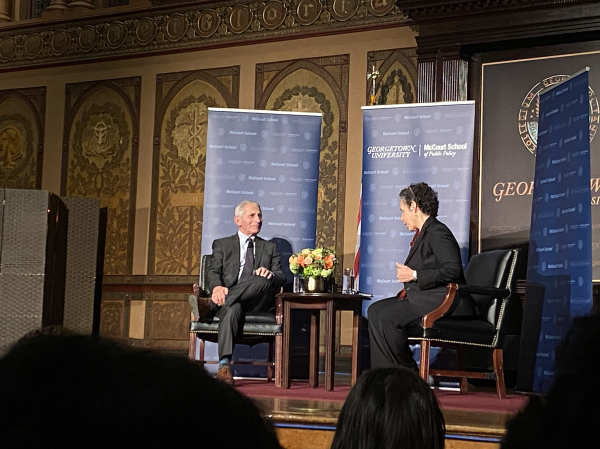Dr. Anthony Fauci discussed the importance of public health and scientific and policy lessons from the pandemic in Gaston Hall Feb. 1 as part of Georgetown University’s annual Whittington Lecture.
During his lecture, Fauci reflected on 10 lessons he learned from the COVID-19 pandemic and discussed the state of preparedness for the future of medical policy. He discussed the history of COVID-19 and described the factors like it being an aerosol virus, meaning it lingered in the air, and asymptomatic transmission, the ability to pass the virus with no symptoms, that made the COVID-19 novel virus significant across the globe.
Fauci, who joined Georgetown as a distinguished university professor in July 2023 and spoke on campus in April 2023, said he felt honored to give the Whittington Lecture as a member of the Georgetown community and to honor the Whittington family, a Georgetown family who perished in the Sept. 11 terrorist attacks, with his focus on public policy.
“I want to start off by first expressing how pleased and honored to be now a member of the Georgetown family,” Fauci said at the event. “I am also very pleased and humbled to pay homage to Leslie Whittington and her family.”
The Whittington Lecture is an annual lecture given by prominent figures in public policy named after the late Leslie Whittington for her contributions to the Georgetown Public Policy Institute (GPPI), now known as the McCourt School of Public Policy. Whittington, along with her husband and two children, died during the Sept. 11 attack on the Pentagon. The Whittington Lecture aims to celebrate her contribution to public policy such as being an associate dean in the GPPI and work that studied the impact of taxes on families and children while at Georgetown.
Previous lecturers included speakers like Rep. Hakeem Jeffries (D-N.Y.), who is the Democratic caucus leader in the House of Representatives; Paul Ryan, the former Republican Speaker of the House; Sen. Elizabeth Warren (D-MA); and Steven Chu, a U.S. secretary of energy for the Barack Obama Administration.

 Fauci has served as an adviser to seven U.S. presidents including Former President Donald Trump and President Joseph Biden during the pandemic. He also served as the director at the National Institute of Allergy and Infectious Diseases (NIAID) through the National Institutes of Health (NIH).
Fauci has served as an adviser to seven U.S. presidents including Former President Donald Trump and President Joseph Biden during the pandemic. He also served as the director at the National Institute of Allergy and Infectious Diseases (NIAID) through the National Institutes of Health (NIH).
Fauci said the speed of the pandemic was because of the contagious SARS-CoV-2 variant of COVID-19 that originated in Wuhan, China, in December 2019.
He said the speed of SARS-CoV-2 made the World Health Organization (WHO), an organization that tracks diseases and aims to expand healthcare coverage, declare a pandemic following two and a half months of increased cases and rising deaths. By March 2020, 118,000 COVID-19 cases emerged with close to 5,000 deaths before the official pandemic distinction.
Fauci said the current variants of COVID-19, particularly JN.1, which is similar to previous variants yet has the ability to transmit more effectively, are the most common in the United States and represent the unique ability of this novel virus to adapt over time.
“I can’t express strongly enough how different that is from any other respiratory virus that we’ve ever experienced,” Fauci said. “Within one season, albeit a four-year season, we’ve had multiple variants of the same virus. That is truly unprecedented.”
The Centers for Disease Control (CDC) has reported nearly 7,000,000 total hospitalizations and 1,172,229 total deaths in the United States as of Feb. 1.
The first lesson Fauci reflected upon was “expect the unexpected,” referring to the quickly changing science of COVID-19 that impacts the understanding of COVID-19 today.
“For those of us who are getting infected now, last week, last month, you very likely got infected with JN.1, which is now more than 90% of the isolates, different from those who got infected in January, February or March of 2020,” Fauci said.
Fauci said it is important to use prior research to countermeasure a pandemic. He said this tactic was particularly important when developing the COVID-19 vaccine with a vaccine platform of mRNA, a piece of genetic material that tells the body how to make protein —the structure of a vaccine that uses mRNA to develop antibodies.
“Less than a year, 311 days later, the interim analysis said we have a vaccine that’s safe, and that’s 94 to 95% effective, which is beyond unprecedented in vaccinology,” Fauci said.
The prior research Fauci referenced was the mRNA vaccine research against human immunodeficiency virus (HIV), a virus that attacks the immune system and can develop into acquired immunodeficiency syndrome (AIDS) if untreated.
Fauci and his team at the NIH pioneered this research in 1987 to understand how viruses and mRNA are connected and how to respond to viruses using mRNA.
Fauci’s final lesson from the pandemic was that it is not over until it is over, which he said may never happen. He said the ability to be prepared for future health crises with scientific research is the most significant way to be prepared for the emergence of future infectious diseases.
“The only way to be prepared for the perpetual challenge is by being perpetually prepared,” Fauci said. “For me, that is the final and most compelling lesson that we’ve learned from COVID-19.”








